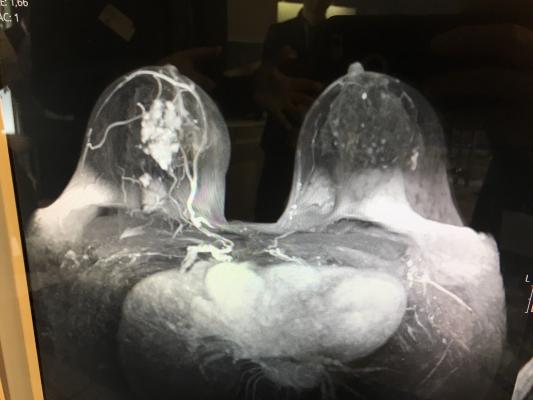
May 9, 2019 — When appropriate, short-interval follow-up magnetic resonance imaging (MRI) can be used to identify early-stage breast cancer and avoid unnecessary biopsies, according to a new study. The findings were presented at the American Roentgen Ray Society (ARRS) 2019 Annual Meeting, May 5-10 in Honolulu.
Utilization of MRI for breast cancer screening continues to increase, as it is the most sensitive modality to detect breast cancer. Yet, much more is known about short-term follow-up of probably benign findings (<2 percent of malignancy) for mammography than MRI. The study was conducted to evaluate the frequency and cancer yield of American College of Radiology (ACR) Breast Imaging Reporting and Data System (BI-RADS) 3 lesions in patients undergoing baseline versus non-baseline high-risk screening MRI exams. Non-baseline MRI screening exams were defined as those preceded by at least one screening exam.
Among the 6,672 MRI screening exams performed in 3,214 patients included in the study, 202 (3 percent) were assigned a BI-RADS 3. Among baseline exams, 8.3 percent (82/983) were assigned BI-RADS 3, compared to 2.1 percent (120/5689) of non-baseline exams (p<0.01). Thirteen of 202 (6.4 percent) of the total BI-RADS 3 lesions yielded malignancy, with 12 of the 13 cancers described as either stage 0 or I at diagnosis. Out of 82 baseline exams, the cancer yield of BI-RADS 3 was 2 (2.4 percent), versus 11 of 120 (9.2 percent) on non-baseline exams (p=0.056). Of the 13 diagnosed cancers, eight were initially characterized as foci, three as non-mass enhancement and two as masses. Ten of 13 cancers were upgraded at the six-month follow-up MRI or before.
The results indicate BI-RADS 3 assessments are significantly more common in baseline versus non-baseline screening breast MRI exams, and BI-RADS 3 lesions on baseline exams have a lower cancer yield. Most cancers diagnosed on follow-up of BI-RADS 3 lesions are early stage and most are diagnosed at or before the six-month follow-up. The results indicate that when employed sensibly, short-interval follow-up MRI is an appropriate technique to identify early-stage breast cancer. "This study clarifies that probably benign assessments can be as useful for MRI as they are for mammography," said co-author Leslie Lamb, M.D., MSc, of Massachusetts General Hospital (MGH) and Harvard Medical School, both in Boston.
"Many patients and providers question the utility of BI-RADS 3 in MRI, particularly as some insurers do not cover the costs of the short interval follow-up MRIs. This study clarifies that short interval follow-up MRI is a valuable method of identifying early stage breast cancer while avoiding unnecessary biopsies." noted co-author Christine Edmonds, M.D., of the department of radiology at MGH.
For more information: www.arrs.org
Related Dense Breast Content:
Animation to Bring Clarity to Dense Breasts
Improving Clinical Image Quality for Breast Imaging
Breast Imaging in the Age of Coronavirus
Abbreviated MRI Outperforms 3-D Mammograms at Finding Cancer in Dense Breasts
VIDEO: Use of Breast MRI Improved Cancer Detection in Dense Breasts in Dutch Study — Interview with Gillian Newstead, M.D.


 February 13, 2026
February 13, 2026 









